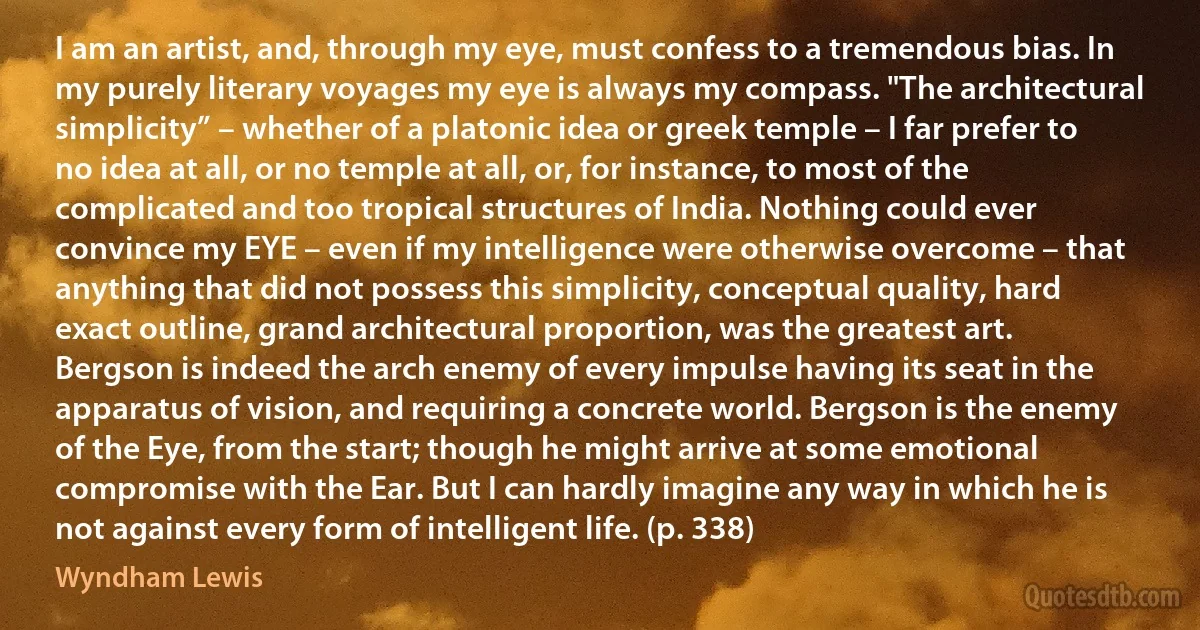
I am an artist, and, through my eye, must confess to a tremendous bias. In my purely literary voyages my eye is always my compass. "The architectural simplicity” – whether of a platonic idea or greek temple – I far prefer to no idea at all, or no temple at all, or, for instance, to most of the complicated and too tropical structures of India. Nothing could ever convince my EYE – even if my intelligence were otherwise overcome – that anything that did not possess this simplicity, conceptual quality, hard exact outline, grand architectural proportion, was the greatest art. Bergson is indeed the arch enemy of every impulse having its seat in the apparatus of vision, and requiring a concrete world. Bergson is the enemy of the Eye, from the start; though he might arrive at some emotional compromise with the Ear. But I can hardly imagine any way in which he is not against every form of intelligent life. (p. 338)
Wyndham LewisRelated topics
anything apparatus arrive art bias compromise concrete ear emotional enemy eye far form hard having idea instance intelligence life might nothing outline overcome platonic quality requiring seat start tropical vision way worldRelated quotes
Islamic literary sources provide far more extensive evidence of temple destruction by the Muslim invaders of India in medieval times. They also cover a larger area, from Sinkiang and Transoxiana in the North to Tamil Nadu in the South, and from the Seistan province of present-day Iran in the West to Assam in the East. As we wade through this evidence, we can visualise how this vast area, which was for long the cradle of Hindu culture, came to be literally littered with the ruins of temples and monasteries belonging to all schools of Sanãtana Dharma-Bauddha, Jaina, Šaiva, Šãkta, VaishNava and the rest. Archaeological explorations and excavations in modern times have proved unmistakably that most of the mosques, mazãrs, ziãrats and dargãhs which were built in this area in medieval times, stood on the sites of and were made from the materials of deliberately demolished Hindu monuments.

Sita Ram Goel
[wrote_the_exam]What keeps me awake at night: wondering whether human species is just too stupid to figure out the Universe. I just wonder. I lose sleep over that. Because we define ourselves as intelligent- because we made up the test to say that. And we sit alone at the top of the intelligence chart because we invented the exam, and all the other species of life on Earth are not. So who's to say that the first species (us) to be intelligent (us) has just enough intelligence to actually decode everything that's decodable in the Cosmos? [...] Think of the next closest thing to us, the bonobo chimp- 98½% identical DNA, yet you cannot teach them trigonometry, they have no concept of it. So if that's only 1½% difference in our DNA- and so imagine 1½% beyond us, rather than below us, in intelligence. [...] Their toddlers would be talking about things that would completely confound us.

Neil deGrasse Tyson
I've been educated in some pretty lively barrooms, like the Cedar Bar in New York. And I went to high school with Frank Stella and when he got out of college he went to New York and started painting... I was working with sculpture in a kind of dilatory way, and he said to come up and work in his tiny loft when he wasn't there. At the same time I sort of dabbled in a little bit of painting, and a kind of confusion. I was an eye, ear, nose, and throat person too... One day Frank Stella just said to me, 'Look, if you paint another painting I'm going to cut off your hands.' I asked, 'Can't I become a good painter?' Frank said, 'No, because you are a good sculptor now.' That's really my formal education.... the company of artists is the great education. We educate each other. I've learned from older, wiser people by the old Greek method of sitting down and drinking with them. And that's how I received my education.

Carl Andre
The Grand Inquisitor explains that you have to create mysteries because otherwise the common people will be able to understand things. They have to be subordinated so you have to make things look mysterious and complicated. That's the test of the intellectual. It's also good for them: then you're an important person, talking big words which nobody can understand. Sometimes it gets kind of comical, say in post-modern discourse. Especially around Paris, it has become a comic strip, I mean it's all gibberish. But it's very inflated, a lot of television cameras, a lot of posturing. They try to decode it and see what is the actual meaning behind it, things that you could explain to an eight-year old child. There's nothing there. But these are the ways in which contemporary intellectuals, including those on the Left, create great careers for themselves, power for themselves, marginalize people, intimidate people and so on.

Noam Chomsky
Let your self go. If you can approach the world's complexities, both its glories and its horrors, with an attitude of humble curiosity, acknowledging that however deeply you have seen, you have only scratched the surface, you will find worlds within worlds, beauties you could not heretofore imagine, and your own mundane preoccupations will shrink to proper size, not all that important in the greater scheme of things.' Keeping that awestruck vision of the world ready to hand while dealing with the demands of daily living is no easy exercise, but it is definitely worth the effort, for if you can stay centered, and engaged, you will find the hard choices easier, the right words will come to you when you need them, and you will be a better person. That, I propose, is the secret to spirituality, and it has nothing at all to do with believing in an immortal soul, or in anything supernatural.

Daniel Dennett
